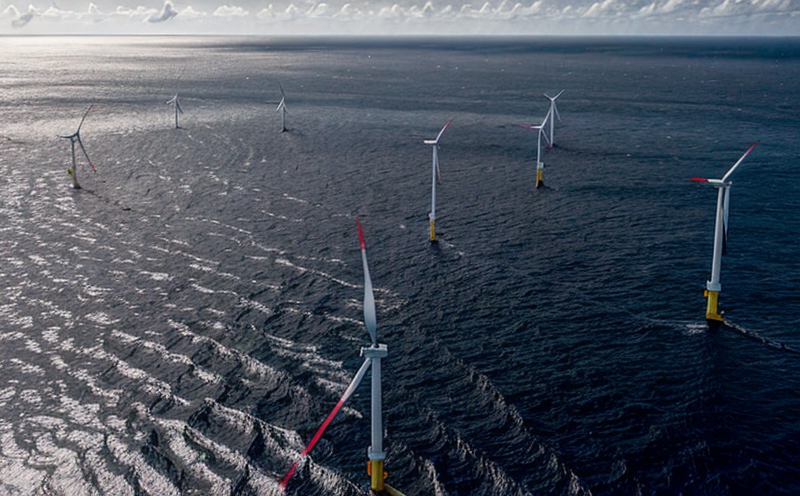ASTM D1586 Soil Load Bearing Testing for Farm Foundations
The ASTM D1586 standard is a critical tool in ensuring that wind farm foundations are capable of withstanding the immense loads they will encounter. This testing method evaluates the soil’s ability to support the structure, which is essential for the safety and longevity of off- and onshore wind farms.
Wind turbines generate significant torque and lateral forces during operation, making it imperative that their foundations are designed based on accurate soil load-bearing capacity data. ASTM D1586 provides a standardized approach to perform these tests in a controlled laboratory setting before foundation installation. This ensures that the design meets local geotechnical conditions, thus reducing the risk of premature failure and potential environmental impacts.
The testing involves placing a specified weight on top of a soil sample in a pressure vessel or similar apparatus until it reaches its maximum capacity. The load is then gradually removed, and the residual settlement is measured to determine the ultimate bearing capacity of the soil. This process helps engineers select suitable foundation types for specific locations while minimizing costs associated with incorrect design assumptions.
Accurate testing per ASTM D1586 is not just about meeting regulatory requirements but also about enhancing safety standards and optimizing resource utilization. By using this standard, stakeholders can achieve a balance between cost-effectiveness and performance reliability, which is particularly important given the increasing demand for renewable energy sources.
For wind farms in various geographical locations, soil characteristics vary significantly due to factors like climate, terrain, and proximity to water bodies. Therefore, local geotechnical data should be incorporated into ASTM D1586 testing protocols whenever possible. This ensures that the results are relevant and applicable to real-world conditions, thereby improving the overall design process.
Compliance with ASTM D1586 is essential for several reasons:
- To ensure structural integrity of wind farm foundations
- To comply with local building codes and regulations
- To minimize environmental impact by avoiding unnecessary construction activities in sensitive areas
- To reduce insurance premiums associated with potential accidents or failures
Why It Matters
The significance of ASTM D1586 soil load bearing testing for wind farm foundations cannot be overstated. Properly conducted tests provide a reliable basis for determining the appropriate foundation type and dimensions, which directly influence the overall stability and efficiency of the wind turbine installation.
Without accurate knowledge of soil properties, engineers might overspecify or underspecify foundation requirements, leading to either excessive material usage or insufficient support. Both scenarios have substantial implications regarding construction costs, energy output, and operational expenses.
The cost-effectiveness of using ASTM D1586 is particularly notable when considering the long-term maintenance needs of wind farms. Foundations that are correctly designed based on soil load-bearing capacity data require less frequent repairs and replacement, translating into lower lifecycle costs for operators.
Moreover, the environmental benefits cannot be ignored. By ensuring robust foundations through rigorous testing, developers can avoid unnecessary excavation or modifications in environmentally sensitive areas, thus promoting sustainable practices within the renewable energy sector.
Eurolab Advantages
Eurolab is committed to providing world-class services that meet international standards like ASTM D1586. Our state-of-the-art facilities and experienced personnel ensure precision and reliability in every test conducted.
- Expertise and Experience: Eurolab’s team comprises highly skilled professionals with extensive experience in geotechnical engineering, ensuring accurate interpretation of results.
- Advanced Equipment: We employ cutting-edge instrumentation to measure soil properties accurately, providing comprehensive data for informed decision-making.
- Comprehensive Reporting: Our detailed reports include all necessary information and recommendations based on the ASTM D1586 testing results, facilitating seamless integration into project designs.
- Regulatory Compliance: Eurolab ensures that all tests comply with relevant international standards, guaranteeing legal compliance for our clients.
Competitive Advantage and Market Impact
EuroLab’s proficiency in ASTM D1586 testing offers several competitive advantages that contribute to its market leadership:
- Accurate Data for Optimal Design: By providing precise soil load-bearing capacity data, Eurolab enables wind farm developers to make informed decisions about foundation types and dimensions.
- Sustainability Focus: Our commitment to sustainable practices ensures that projects are environmentally friendly, contributing positively to the green energy market.
- Cost Efficiency: Through accurate testing, we help avoid unnecessary expenses associated with incorrect designs or excessive material use.
- Regulatory Compliance: Ensuring adherence to international standards helps clients navigate regulatory landscapes more effectively and efficiently.





